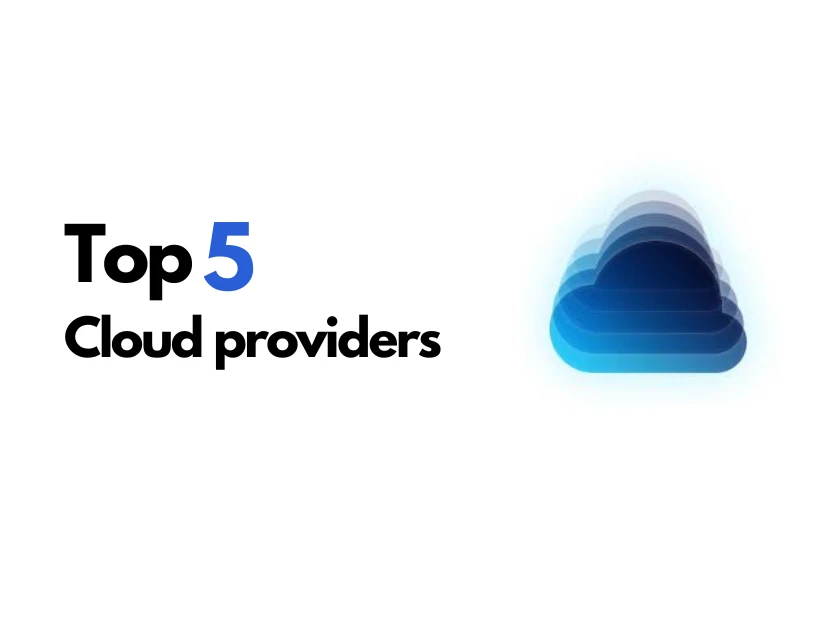As businesses continue to adapt to the digital age, cloud computing has emerged as a key enabler of growth, flexibility, and innovation. Cloud services allow companies to access computing resources, data storage, and software applications over the internet, eliminating the need for costly on-premise infrastructure. In 2025, cloud adoption is expected to soar as organizations seek more scalable, efficient, and secure solutions for their digital transformation journeys. This blog explores the top 5 cloud service providers that are shaping the future of cloud computing and how they are empowering businesses worldwide.
1. Amazon Web Services (AWS)
Overview:
Amazon Web Services (AWS) is the dominant force in the global cloud services market, boasting a comprehensive suite of tools and services that cater to businesses of all sizes. Launched in 2006, AWS has grown exponentially, offering cloud solutions for computing, storage, databases, machine learning, security, and more. As of 2025, AWS remains at the forefront of innovation, with a significant market share and an extensive global infrastructure.
Key Features:
- Scalability & Flexibility: AWS offers elastic computing capabilities through Amazon EC2, which allows businesses to scale resources according to demand. This scalability is critical for businesses with fluctuating workloads.
- Wide Array of Services: AWS provides over 175 fully featured services, ranging from data storage with Amazon S3 to high-performance computing (HPC) and AI tools like SageMaker.
- Global Availability: With a presence in 26 geographic regions and availability zones worldwide, AWS ensures high availability and disaster recovery options for businesses operating in multiple regions.
- Security & Compliance: AWS offers robust security features, including identity and access management (IAM), encryption, and compliance with industry regulations such as GDPR and HIPAA.
Why AWS?
AWS is the best choice for companies seeking flexibility and a wide range of services. Its comprehensive infrastructure and continued focus on innovation make it the go-to solution for businesses looking to power their digital transformation.
2. Microsoft Azure
Overview:
Microsoft Azure is a leading cloud platform that is known for its strong integration with existing Microsoft products such as Office 365, Windows Server, and Active Directory. For businesses already entrenched in Microsoft technologies, Azure provides a seamless and secure cloud migration path, making it an ideal choice for large enterprises and hybrid environments.
Key Features:
- Hybrid Cloud Capabilities: One of Azure's standout features is its hybrid cloud capabilities. With Azure Arc and Azure Stack, businesses can integrate on-premise infrastructure with cloud services, providing a flexible and cost-effective solution for companies in regulated industries.
- Integration with Microsoft Products: Azure's deep integration with Microsoft products, such as SQL Server, SharePoint, and Microsoft 365, enables businesses to move to the cloud without significant changes to their existing IT ecosystem.
- AI and Machine Learning: With tools like Azure Machine Learning and Cognitive Services, Azure enables businesses to deploy advanced AI models and applications.
- Security: Azure's security framework includes multi-layered protection, role-based access control, and compliance with international standards like ISO 27001 and SOC 2.
Why Azure?
For businesses already using Microsoft tools, Azure offers the most seamless and comprehensive cloud experience. Its hybrid cloud capabilities and robust security measures make it an attractive option for enterprises looking to integrate their legacy systems with the cloud.
3. Google Cloud Platform (GCP)
Overview:
Google Cloud Platform (GCP) has gained significant traction in recent years, particularly in the fields of artificial intelligence (AI), machine learning (ML), and data analytics. Google’s expertise in big data and cutting-edge technologies is evident in GCP’s suite of services, making it an attractive option for data-driven businesses and organizations looking to leverage Google’s technological innovations.
Key Features:
- Data Analytics and Big Data: Google Cloud offers some of the most powerful data analytics tools on the market, including BigQuery, a serverless data warehouse that allows businesses to run lightning-fast queries on massive datasets.
- Machine Learning & AI: GCP offers a wide array of machine learning services, including TensorFlow, an open-source library for building AI applications, and AutoML, a tool for automating the creation of custom machine learning models.
- Kubernetes and Containers: GCP is home to Google Kubernetes Engine (GKE), a powerful container orchestration platform that is widely used for building and deploying containerized applications at scale.
- Global Network Infrastructure: GCP’s network infrastructure is powered by Google’s backbone network, which is one of the largest and most reliable in the world.
Why GCP?
GCP is an excellent choice for businesses with large datasets or those focused on AI and machine learning. The platform's cutting-edge data analytics tools, combined with Google’s world-class network infrastructure, make it a strong contender for companies looking to harness the power of big data and machine learning.
4. IBM Cloud
Overview:
IBM Cloud is a robust and secure cloud platform that is ideal for enterprises with complex workloads. IBM has been a long-time leader in the enterprise technology space, and its cloud platform leverages its strengths in AI, hybrid cloud, and cognitive computing. IBM Cloud is particularly attractive for industries that require high levels of customization and integration, such as finance, healthcare, and manufacturing.
Key Features:
- Hybrid and Multi-Cloud Solutions: IBM Cloud offers powerful hybrid cloud solutions that enable businesses to integrate on-premises infrastructure with cloud resources seamlessly. This is especially valuable for companies that need to maintain control over some workloads while leveraging the cloud for others.
- IBM Watson: IBM Watson is a powerful AI platform that provides cognitive computing services such as natural language processing (NLP), visual recognition, and machine learning. Businesses can leverage Watson for everything from customer service chatbots to complex data analysis.
- Blockchain and IoT: IBM Cloud has unique offerings for industries looking to adopt blockchain technology or Internet of Things (IoT) solutions. IBM's blockchain platform is used by businesses for secure, transparent transactions, while its IoT services help companies optimize operations with connected devices.
- Security & Compliance: IBM Cloud’s strong security framework includes encryption, access management, and compliance with industry regulations such as GDPR and HIPAA.
Why IBM Cloud?
IBM Cloud is ideal for enterprises that require advanced security, AI capabilities, and hybrid cloud solutions. Its deep industry expertise and support for cutting-edge technologies like blockchain and IoT make it a great choice for businesses in highly regulated industries.
5. Oracle Cloud
Overview:
Oracle Cloud has evolved into a leading cloud service provider, particularly for businesses that rely on data-intensive applications. Oracle is a dominant force in database management and enterprise resource planning (ERP) systems, and its cloud offerings reflect this expertise. As of 2025, Oracle Cloud is growing rapidly, especially among organizations looking for integrated database and enterprise applications in the cloud.
Key Features:
- Oracle Autonomous Database: Oracle's autonomous database is a game-changer for businesses looking to automate database management. The platform uses AI and machine learning to manage performance, security, and scalability without manual intervention.
- Cloud ERP: Oracle Cloud offers robust enterprise resource planning (ERP) solutions that integrate finance, HR, supply chain management, and customer experience. These tools help businesses streamline operations and drive innovation.
- Integration with Oracle Applications: Oracle Cloud is tightly integrated with Oracle's suite of enterprise applications, providing seamless cloud adoption for businesses already using Oracle software.
- Security and Compliance: Oracle Cloud provides industry-leading security tools, including data encryption, identity management, and compliance certifications for highly regulated industries.
Why Oracle Cloud?
Oracle Cloud is perfect for businesses that already rely on Oracle products and require powerful database management solutions. Its deep integration with Oracle's ERP and business applications makes it an excellent choice for organizations looking to streamline operations and scale their digital transformation efforts.
Conclusion
The cloud service provider landscape in 2025 is more competitive than ever, with companies looking for scalable, flexible, and secure solutions to power their digital transformations. Whether you’re an enterprise looking for hybrid cloud solutions, a startup seeking scalability, or a data-driven organization exploring advanced analytics, the top 5 cloud service providers—AWS, Microsoft Azure, Google Cloud Platform, IBM Cloud, and Oracle Cloud—offer a variety of solutions to meet your needs.
Choosing the right provider is crucial, and businesses often turn to IT consulting companies in India to help guide them in selecting the best cloud solution for their unique requirements. With the right cloud partner, organizations can optimize operations, reduce costs, and stay ahead in an increasingly digital world.



